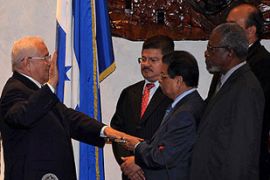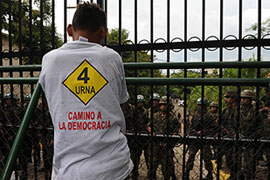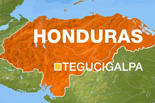World leaders condemn Honduran coup
UN chief leads chorus of criticism over removal of president.

Forced exile
Zelaya was ousted and flown to Costa Rica just hours before a planned controversial vote asking Hondurans to sanction a future referendum to allow him to run for re-election after his term ends in January.
| In depth |
|
|
The vote had been ruled illegal by the country’s top court and was opposed by the military, but the president had said he planned to press ahead.
Following a supreme court order for Zelaya’s to be removed, Roberto Micheletti, the parliamentary speaker, was sworn in as the country’s new leader until the presidential term ends in January.
Leaders across the Americas firmly condemned the situation, with Barack Obama, the US president, saying he was “deeply concerned”.
“I call on all political and social actors in Honduras to respect democratic norms [and] the rule of law,” he said, adding that “any existing tensions and disputes must be resolved peacefully through dialogue free from any outside interference”.
US blamed
Obama’s remarks came after Hugo Chavez, the Venezuelan president, said he saw the hand of the US in the coup.
“The Yankee empire has a lot to do” with developments in Honduras, he told Venezuelan television and called on Obama “to issue a statement as we have, rejecting this affront, which not only goes against Honduras but against all the peoples of Latin America”.
| Country facts |
|
|
Chavez also threatened to militarily “bring down” any government that comes to power in Honduras after the coup.
He said that if Venezuela’s envoy to Honduras were harmed or troops entered the Venezuelan embassy, the military government “would be entering a de facto state of war – we would have to act militarily”.
Despite being elected in 2006 as a member of a conservative party, Zelaya has moved to the left since taking power, aligning himself with Chavez and Evo Morales, his Bolivian counterpart.
Mark Weisbrot, co-director of the Washington-based Centre for Economic and Policy Research, told Al Jazeera that there were likely to be further questions raised about Washington’s role in events.
“The United States really has to take a leadership role here or there is going to be lots of suspicion,” he said.
“They have a very close relationship with the Honduran military, it is probably one of the closest relationships that the United States has with a military in the hemisphere and it has been going on for decades.”
Bruno Rodriguez, the Cuban foreign minister, denounced the “brutal and criminal coup” in Honduras and demanded the return of Zelaya whom he described as the “sole legitimate president” of Honduras.
International protest
 |
| Honduras has been placed under curfew following Zelaya’s removal [AFP] |
Jose Miguel Insulza, the secretary general of the Organisation of American States, in a statement issued before an emergency meeting of the group in Washington, “strongly condemned” the political takeover.
He called Hondurans, neighbouring governments and the international community to protest the “grave disturbance of the democratic process currently being enjoyed throughout the continent”.
The French foreign ministry in a statement “firmly condemning” the coup, said the arrests and expulsions of diplomatic envoys were “a grave breach of the Vienna convention” and urged “all parties to act with respect for the principles and values of democracy”.
“They are unacceptable. The constitutional order must be restored at the earliest opportunity.”
In Spain the office of Jose Luis Rodriguez Zapatero, the prime minister, issued a statement calling for Zelaya’s “immediate reinstatement to the democratically elected position”, adding that a solution must be found “through dialogue and respect for the democratic process”.


